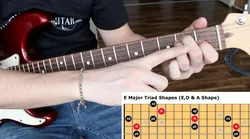
Music Theory 101 For Guitar 
Henry Olsen's Music Theory 101 For Guitar course is designed to help guitarists understand the fretboard, build any chord, and play in any key. With this course, guitarists can gain the knowledge and skills to take their playing to the next level. ▼
ADVERTISEMENT
Course Feature
![]() Cost:
Cost:
Free Trial
![]() Provider:
Provider:
Skillshare
![]() Certificate:
Certificate:
Paid Certification
![]() Language:
Language:
English
![]() Start Date:
Start Date:
On-Demand
Course Overview
❗The content presented here is sourced directly from Skillshare platform. For comprehensive course details, including enrollment information, simply click on the 'Go to class' link on our website.
Updated in [March 06th, 2023]
Henry Olsen's Music Theory 101 For Guitar course is designed to help guitarists of all levels understand the fretboard, build any chord, and play in any key. Through practical, everyday examples and explanations, students will learn the musical alphabet, secret formulas and shortcuts, intervals, triads, keys, chords, inversions, scales, and more. The course also comes with "in-video" scales and charts, downloadable PDFs, and a 42-page picture chord book. Henry has been teaching guitar for eight years and has a 4.5 average rating after almost 3000 reviews on Udemy. Students have praised the course for its simple and easy step-by-step learning, well-constructed and balanced content, and informative and stimulating lectures. Join now and become the guitar player you've always dreamed of being!
[Applications]
After taking Music Theory 101 For Guitar, students will be able to apply their newfound knowledge to the guitar in a practical way. They will be able to understand and build any chord, play and understand intervals in any key, master and visualize the entire fretboard, develop and locate triads and "triad islands" all over the neck, understand relative major/minor keys and how to use them, learn sus2, sus4, 7th, minor 7th, 9th,11th, 13, diminished, augmented and many more types of chords, understand chord inversions and effective ways of using them, master the major & minor scale in any key, learn how the notes from the major scale are used to build chords within a key, learn how to play and visualize the major & minor scale on any string, and understand how intervals relate to chords and their color. With this knowledge, students will be able to play songs with ease and confidence, and be the star at any family gathering.
[Career Paths]
Recommended career paths for learners of this course include:
1. Music Producer: Music producers are responsible for overseeing the production of music recordings. They work with artists, songwriters, and engineers to create the best possible recordings. They also manage budgets, coordinate recording sessions, and ensure that the recordings meet the artist's vision. As technology advances, music producers are increasingly using digital tools to create and mix music.
2. Music Educator: Music educators are responsible for teaching music theory, composition, and performance to students of all ages. They may teach in schools, universities, or private studios. Music educators must have a deep understanding of music theory and be able to communicate it effectively to their students. As technology advances, music educators are increasingly using digital tools to teach music.
3. Music Therapist: Music therapists use music to help people with physical, emotional, and mental health issues. They use music to help people express themselves, cope with stress, and improve their overall wellbeing. Music therapists must have a deep understanding of music theory and be able to use it to help their clients. As technology advances, music therapists are increasingly using digital tools to create and deliver music therapy sessions.
4. Music Composer: Music composers are responsible for creating original music for films, television shows, video games, and other media. They must have a deep understanding of music theory and be able to use it to create music that fits the mood and tone of the project. As technology advances, music composers are increasingly using digital tools to create and mix music.
[Education Paths]
Recommended degree paths for Music Theory 101 For Guitar include:
1. Bachelor of Music: This degree provides a comprehensive education in music theory, composition, performance, and music technology. It is designed to give students a strong foundation in music theory and the ability to apply it to their own creative projects. The degree also covers topics such as music history, music production, and music business. Developing trends in this degree path include the use of technology to create and produce music, as well as the use of digital tools to create and distribute music.
2. Master of Music: This degree is designed to provide advanced training in music theory, composition, performance, and music technology. It is designed to give students a deeper understanding of music theory and the ability to apply it to their own creative projects. The degree also covers topics such as music history, music production, and music business. Developing trends in this degree path include the use of technology to create and produce music, as well as the use of digital tools to create and distribute music.
3. Doctor of Musical Arts: This degree is designed to provide advanced training in music theory, composition, performance, and music technology. It is designed to give students a comprehensive understanding of music theory and the ability to apply it to their own creative projects. The degree also covers topics such as music history, music production, and music business. Developing trends in this degree path include the use of technology to create and produce music, as well as the use of digital tools to create and distribute music.
4. Music Technology: This degree is designed to provide advanced training in music technology, including the use of digital tools to create and produce music. It is designed to give students a comprehensive understanding of music technology and the ability to apply it to their own creative projects. The degree also covers topics such as music history, music production, and music business. Developing trends in this degree path include the use of technology to create and produce music, as well as the use of digital tools to create and distribute music.
Pros & Cons

Very helpful and informative

Fun to watch and exercise

Well organized and paced

Great teacher and depth of knowledge

Connects chord changes and different keys

Need more music theory

More examples from songs needed

More guided practice needed

Need to learn musical letter of frets before starting

Not suitable for complete beginners
Course Provider

Provider Skillshare's Stats at AZClass
Discussion and Reviews
0.0 (Based on 0 reviews)
Explore Similar Online Courses

Microsoft Access 2016 Master Class: Beginner to Advanced

Learning Kali Linux

Python for Informatics: Exploring Information

Social Network Analysis

Introduction to Systematic Review and Meta-Analysis

The Analytics Edge

DCO042 - Python For Informatics

Causal Diagrams: Draw Your Assumptions Before Your Conclusions

Whole genome sequencing of bacterial genomes - tools and applications

Orchestral Music Composition & Music Theory for Video Games

Music Theory for Songwriters: From Beginner to Producer


Start your review of Music Theory 101 For Guitar